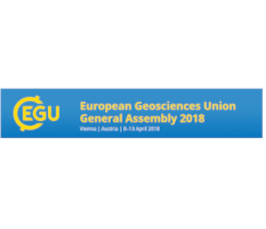European Geosciences Union General Assembly 2018
- Beginn: 08.04.2018
- Ende: 13.04.2018
- Ort: Vienna, Austria
- Gastgeber: Markus Reichstein, Dorothea Frank, Sönke Zaehle, Miguel Mahecha, Mirco Migliavacca, Nuno Carvalhais,

IE4.5/AS5.14/BG1.22/CL5.26/EMRP4.35/ESSI2.12/GD10.7/GI1.7
Information extraction from satellite observations using data-driven
methods (co-organized)
(Co-)Convener: Miguel Mahecha
The unprecedented volumes of satellite Earth observation data gathered
today allow for thorough investigation of the Earth's climate system and
its interactions with the biosphere. Several international research
initiatives and scientific projects are focused on the application of
mathematical and statistical methods to extract insights about the
functioning of the hydrosphere, biosphere and atmosphere, from this
emerging Earth information data-cube. However, this data-cube is highly
dimensional, thus innovative data mining and big data tools are
required, and machine-learning methods – such as neural networks, tree
ensembles, random forests or Gaussian processes, among others – can
offer new means to extract valuable information in a rigorous manner.
As we progress through an exponential increase in satellite data
availability, this session aims to bring researchers together to discuss
the current state in big data and machine learning applications to
Earth sciences and remote sensing. We aim to both (a) discuss current
efforts, and (b) identify common challenges for the future.
IE1.1/BG1.15/NH8.7/NP9.3 Climate extremes, biosphere and society: impacts, remote sensing, and feedbacks (co-organized)
(Co-)Convener: Markus Reichstein; Dorothea Frank
This session explores the linkages between climate extremes, biosphere
and societal dynamics. I.e. emphasis is laid on 1) what impacts are
caused by climate extremes on various aspects of the biosphere (incl.
e.g. productivity, biogeochemical cycling, biodiversity) and society
(e.g. political, economic aspects), and 2) which feedbacks exist
amplifying or moderating the intensity, duration or extent of climate
extremes. Empirical, theoretical and modelling studies from local to
global scale are all highly welcome.
BG2.3 Plant traits and biogeochemical cycles, including optimality, acclimation and adaptation in land ecosystem models (co-organized)
(Co-)Convener: Markus Reichstein,Sönke Zaehle
Plant traits extend the range of earth observations to the level of
individual organisms, providing a link to ecosystem function and
modeling in the context of rapid global changes. However, overcoming the
differences in temporal and spatial scales between plant trait data and
biogeochemical cycles remains a challenge. This session will address
the role of plant species, biodiversity and adaptation / acclimation in
the biogeochemical cycles of water, carbon, nitrogen and phosphorus. We
welcome conceptual, observational, experimental and modeling approaches,
and studies from the local to the global scale, including e.g. remote
sensing observations.
BG2.4 Emerging constraints of photosynthesis and respiration at ecosystem to global scales (co-organized)
(Co-)Convener: Markus Reichstein, Mirco Migliavacca
During the last decade, technological developments in field
spectroscopy, isotope flux measurements and quantum cascade lasers have
enabled alternative approaches for constraining ecosystem-scale
photosynthesis and respiration.
In this session we aim at reviewing recent progress made with novel
approaches of constraining ecosystem gross photosynthesis and
respiration and at discussing their weaknesses and future steps required
to reduce the uncertainty of present-day estimates. To this end we are
seeking contributions that use emerging constrains to improve the
ability to quantify respiration and photosynthesis processes at scales
from leaf to ecosystem and global. Particularly welcome are studies
reporting advancements and new developments in CO2 flux partitioning
from eddy covariance data, the use of carbonyl sulfide, sun-induced
fluorescence and stable isotopes approaches. Modelling studies which
enhance our fundamental understanding of ecosystem-atmosphere CO2
exchange at global scale or make use of these emerging new constraints
in data assimilation schemes are also welcome.
BG2.14 Terrestrial ecosystem responses to global change: integrating carbon, nutrient, and water cycles in experiments and models(co-organized)
(Co-)Convener: Sönke Zaehle
Human activities are altering a range of environmental conditions,
including atmospheric CO2 concentration, temperature, precipitation and
nutrient availability. Quantifying and predicting the combined effect of
these changes on biogeochemical fluxes is challenging because carbon,
nutrient, and water cycles are intricately linked in terrestrial
ecosystems. Terrestrial ecosystem models are used for this purpose.
These are routinely tested and calibrated against data from ecosystem
flux measurements, remote sensing, atmospheric inversions and ecosystem
inventories. While these constrain the current mean state of the
terrestrial biosphere, they provide limited information on the
sensitivity of ecophysiological, biogeochemical, and hydrological
processes to environmental changes.
This session focuses on how ecosystem processes respond to changes in
CO2 concentration, temperature, water and nutrient availability. It aims
at fostering the interaction between experimental and modeling
communities by advancing the use of experimental data for model
evaluation and calibration. Contributions include both experimental and
observational studies, as well as modelling exercises spanning a range
of scales and conditions: soil microbial activity, plant ecophysiology,
nutrient cycling, and ecosystem level dynamics.
BG4.12/GI2.26 Global Earth observation and in-situ data for improved understanding of terrestrial ecosystem dynamics (co-organized)(co-organized)
Venue: European Geosciences Union General Assembly 2018 | Vienna | 8 – 13 April 2018
Co-convener:Nuno Carvalhais
Monitoring and modeling of vegetation and ecosystem dynamics is
fundamental in diagnosing and forecasting Earth system states and
feedbacks. However, the underlying ecosystem processes are still
relatively poorly described by Earth system models. Confronting
terrestrial biogeochemical models at multiple temporal and spatial
scales with an ever-increasing amount and diversity of Earth observation
data is therefore needed.
In this session, we present the most recent advances in:
(1) the production of global land surface biophysical and biochemical variables from satellite and in-situ observations;
(2) assessment of plausibility, validation and intercomparisons of these products;
(3) their use in studying global ecosystem dynamics related to, e.g., climate variability and change;
(4) developments of terrestrial biogeochemical models to allow for the integration of new observational datasets
(5) benchmarking and improvement of these models through statistical and model-data integration techniques.